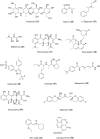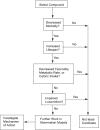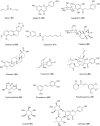Antiaging agents: safe interventions to slow aging and healthy life span extension
- PMID: 35534591
- PMCID: PMC9086005
- DOI: 10.1007/s13659-022-00339-y
Antiaging agents: safe interventions to slow aging and healthy life span extension
Abstract
Human longevity has increased dramatically during the past century. More than 20% of the 9 billion population of the world will exceed the age of 60 in 2050. Since the last three decades, some interventions and many preclinical studies have been found to show slowing aging and increasing the healthy lifespan of organisms from yeast, flies, rodents to nonhuman primates. The interventions are classified into two groups: lifestyle modifications and pharmacological/genetic manipulations. Some genetic pathways have been characterized to have a specific role in controlling aging and lifespan. Thus, all genes in the pathways are potential antiaging targets. Currently, many antiaging compounds target the calorie-restriction mimetic, autophagy induction, and putative enhancement of cell regeneration, epigenetic modulation of gene activity such as inhibition of histone deacetylases and DNA methyltransferases, are under development. It appears evident that the exploration of new targets for these antiaging agents based on biogerontological research provides an incredible opportunity for the healthcare and pharmaceutical industries. The present review focus on the properties of slow aging and healthy life span extension of natural products from various biological resources, endogenous substances, drugs, and synthetic compounds, as well as the mechanisms of targets for antiaging evaluation. These bioactive compounds that could benefit healthy aging and the potential role of life span extension are discussed.
Keywords: Antiaging agents; Antiaging targets; Endogenous substances; Healthy lifespan extension; Longevity; Natural products.
© 2022. The Author(s).
Conflict of interest statement
The author declares no conflict of interest.
Figures









References
Publication types
Grants and funding
LinkOut - more resources
Full Text Sources
Other Literature Sources
Molecular Biology Databases
Miscellaneous

